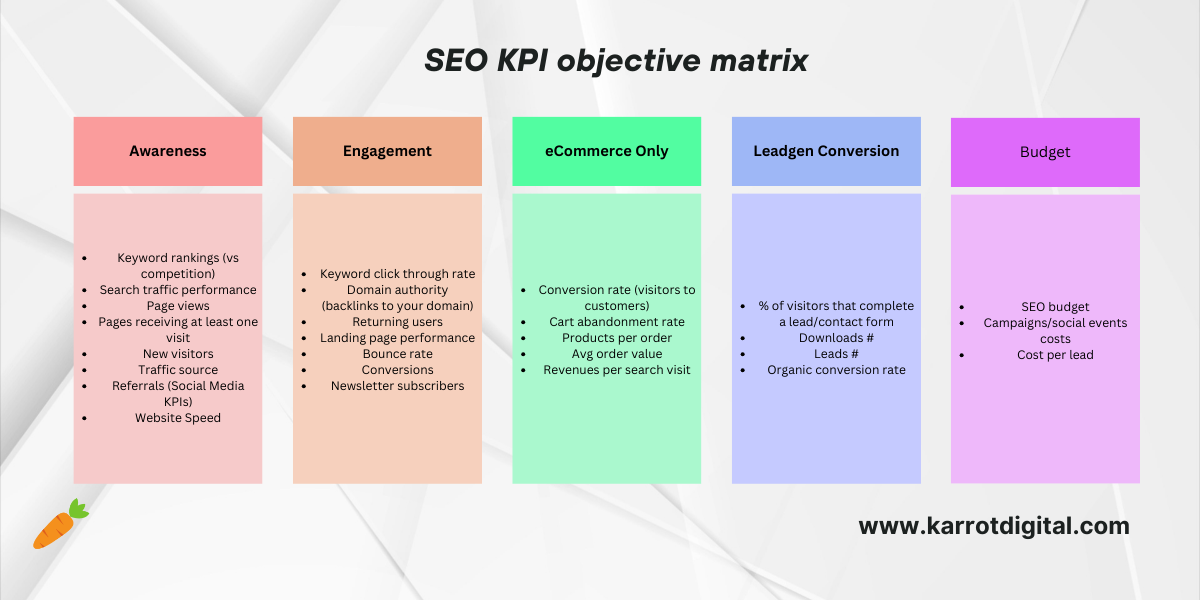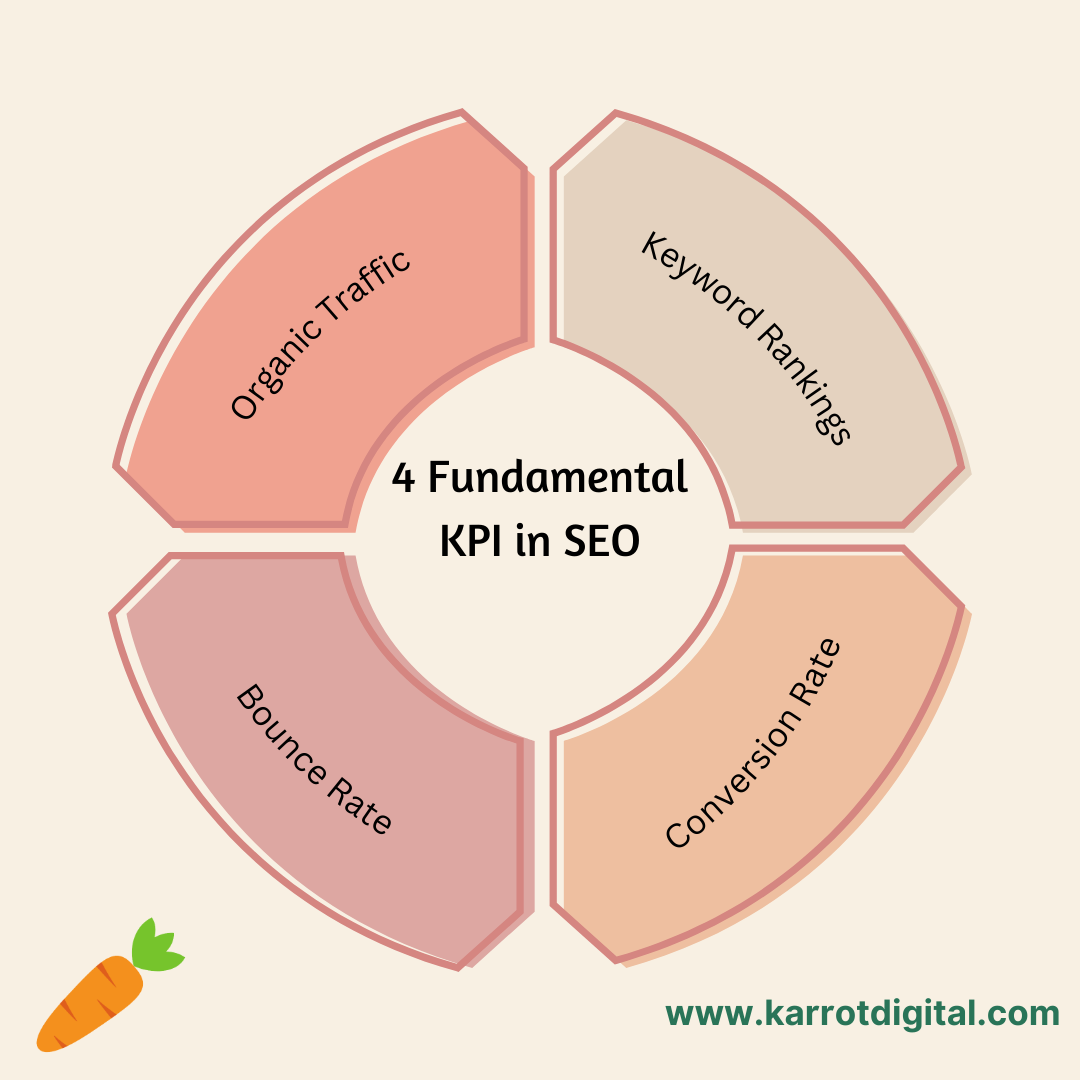Table of content
- What are KPIs in SEO?
- Maximizing SEO Success: Essential KPIs to Measure
- Understanding the Significance of KPIs in SEO
- ROI: The Cornerstone of SEO Evaluation
- Traffic Analysis: Unveiling Engagement Patterns
- Rankings: Beyond Vanity Metrics
- Beyond the Basics: Exploring Additional KPIs
- Analyzing and Optimizing KPIs for Better SEO Performance
- Tracking and Reporting KPIs for Continuous Improvement
- Frequently Asked Questions about KPIs in SEO
- Key Takeaways
- Summarize Table
- FAQs
- Key Takeaways
In the ever-evolving landscape of search engine optimization (SEO), data-driven decision-making is paramount. Key Performance Indicators (KPIs) serve as the compass that guides your SEO efforts, enabling you to measure, analyze, and optimize for success. This comprehensive guide will delve into the essential SEO KPIs you should be tracking, their significance, and how to leverage them to propel your digital marketing strategies to new heights.
What are KPIs in SEO?
KPIs (Key Performance Indicators) are quantifiable metrics that allow you to track and evaluate the effectiveness of your SEO campaigns. They provide valuable insights into the performance of your website, enabling you to identify areas for improvement and make data-driven decisions. In the context of SEO, KPIs help you understand how well your website is performing in search engine results, how users are interacting with your content, and whether your SEO strategies are yielding the desired results.
Maximizing SEO Success: Essential KPIs to Measure
To truly harness the power of SEO, it’s crucial to track the right KPIs. Here are some of the most important SEO KPIs you should be monitoring:
1. Organic Traffic
Organic traffic represents the number of visitors that arrive at your website from organic search results. This metric is arguably the most direct indicator of your SEO performance, as it reflects the effectiveness of your efforts in driving qualified traffic to your site. Monitoring organic traffic using tools like Google Analytics can provide valuable insights into the impact of your SEO work.
2. Keyword Rankings
Tracking your website’s rankings for important keywords is another essential SEO KPI. High rankings for relevant keywords indicate that your content is visible and appealing to your target audience. Tools like Google Search Console and third-party rank tracking tools can help you monitor your keyword rankings and identify opportunities for improvement.
3. Bounce Rate
The bounce rate is the percentage of visitors who leave your website after viewing only one page. A high bounce rate can signify issues with user experience, content relevance, or technical aspects of your site. Monitoring and optimizing this metric can lead to improved engagement and better SEO performance.
4. Conversion Rate
Ultimately, the goal of SEO is to drive conversions, whether that’s sales, lead generation, or other desired actions. Tracking your conversion rate from organic traffic sources is crucial for understanding the return on investment (ROI) of your SEO efforts. By analyzing conversion data, you can identify which keywords, pages, and content are driving the most valuable actions.

Understanding the Significance of KPIs in SEO
SEO is an ongoing process that necessitates a methodical approach toward measurement and analysis. KPIs act as guiding compasses, steering your efforts toward tangible results. Tailoring KPIs to align with your specific campaign objectives ensures relevance and clarity in measurement.
Perspective Matters: Tailoring KPIs to Goals
When it comes to KPIs, adopting a perspective that aligns with your campaign objectives is essential. You may choose to tailor KPIs to assess the performance of your entire website, individual landing pages, or specific sections. This targeted approach allows you to gain granular insights and make informed decisions based on your unique goals.
ROI: The Cornerstone of SEO Evaluation
ROI: A Metric Beyond Vanity Metrics
While vanity metrics like website traffic and keyword rankings can be valuable indicators, the true measure of SEO success lies in its ability to contribute to your bottom line. Return on Investment (ROI) gauges the financial impact of your SEO efforts, demonstrating their tangible value to your business. By showcasing how SEO contributes to revenue generation or cost savings, you can secure buy-in and trust from clients or stakeholders.
Navigating ROI Measurement Across Business Models
The approach to tracking ROI varies depending on your business model. For e-commerce businesses, tracking revenue generated from organic traffic and attributing it to specific keywords or campaigns can provide a clear picture of SEO ROI. Service-based businesses, on the other hand, may need to factor in lead generation, client acquisition costs, and lifetime customer value to accurately measure ROI.
Traffic Analysis: Unveiling Engagement Patterns
Deciphering Traffic Behavior: Key Metrics to Monitor
Traffic analysis goes beyond merely tracking the volume of visitors; it unveils crucial insights into user behavior and engagement patterns. By monitoring metrics such as sessions, conversion rates, bounce rates, and average session duration, you can gain a deeper understanding of how users interact with your content and identify areas for optimization.
Harnessing the Power of Goal Tracking
Effective traffic analysis hinges on setting clear goals that align with your business objectives. Leveraging tools like Google Analytics allows you to define and track specific goals, such as form submissions, purchases, or content downloads. By analyzing goal conversions from organic traffic, you can assess the true value of your SEO efforts and make informed decisions about where to focus your resources.
Rankings: Beyond Vanity Metrics
Rethinking Rankings: Prioritizing Relevance
While high rankings are often celebrated, true SEO success lies in securing top positions for keywords that drive meaningful traffic and conversions. Focusing solely on vanity metrics like overall rankings can lead to misguided efforts and suboptimal results. Instead, prioritize relevant keywords that resonate with your target audience and monitor position changes for these terms to steer your campaigns toward success.
Drill Down: Understanding Keyword Positioning
Effective ranking analysis goes beyond surface-level metrics. Tracking improvements in your keyword rankings offers valuable feedback for optimization efforts, but it’s also important to understand the context behind these changes. By drilling down into metrics like click-through rates (CTRs) and search visibility, you can gain deeper insights into how users perceive and interact with your listings in the search engine results pages (SERPs).
Beyond the Basics: Exploring Additional KPIs
While the KPIs mentioned above are essential for any SEO campaign, there are additional metrics that can provide nuanced insights and a holistic view of your SEO performance. Here are some supplementary KPIs to consider:
Unveiling Hidden Metrics: KPIs Essential for SEO Professionals
- Search visibility: This metric measures the percentage of times your website appears in the search results for relevant queries, providing a comprehensive view of your online presence.
- Click-through rate (CTR): CTR tracks the percentage of users who click on your listing in the search results, indicating the effectiveness of your titles and meta descriptions.
- Dwell time: The amount of time users spend on your pages after clicking through from search results can reveal insights into content quality and user engagement.
Analyzing and Optimizing KPIs for Better SEO Performance
Interpreting KPI Data and Identifying Areas for Improvement
Once you’ve established your KPIs and started tracking performance, the next step is to analyze the data and identify areas for improvement. Look for patterns, anomalies, and opportunities to optimize your SEO strategies. Remember, KPIs are not just numbers; they provide valuable insights into user behavior and preferences, which can inform your decision-making process.
On-page Optimization Techniques to Improve KPIs
- Content optimization: Ensure your content is relevant, engaging, and optimized for your target keywords by following best practices for on-page SEO.
- Technical SEO: Improve website speed, mobile-friendliness, and other technical factors that can impact user experience and search engine crawlability.
- User experience (UX) optimization: Enhance website navigation, layout, and design to create a seamless and intuitive experience for users, reducing bounce rates and increasing engagement.
Off-page Optimization Strategies for Better KPIs
- Link building: Acquire high-quality backlinks from reputable sources to improve your website’s authority and search rankings.
- Social media promotion: Leverage social media platforms to amplify your content and drive more traffic to your website.
- Local SEO: For businesses with a local presence, optimize for local search by claiming and optimizing your Google My Business listing, building local citations, and targeting location-specific keywords.

Tracking and Reporting KPIs for Continuous Improvement
Importance of Regular KPI Monitoring and Reporting
Monitoring your KPIs is not a one-time task; it’s an ongoing process that requires regular attention and adjustment. Set up a cadence for reviewing your KPI performance, whether it’s weekly, monthly, or quarterly, depending on the nature of your business and the pace of change in your industry.
Tools and Dashboards for KPI Tracking and Visualization
Leverage tools like Google Analytics, Google Search Console, and third-party SEO tools to track and visualize your KPIs. Create customized dashboards that consolidate all your relevant metrics in one place, enabling you to quickly identify trends and make data-driven decisions.
Communicating KPI Performance to Stakeholders
Effective communication of KPI performance is crucial for garnering support and buy-in from stakeholders. Use clear and concise reporting methods, such as executive summaries or visual representations (e.g., charts, graphs), to convey the impact of your SEO efforts and the value they bring to the business.
Using KPI Data to Inform Future SEO Strategies
KPI data should not only be used for tracking and reporting purposes but also as a guide for shaping future SEO strategies. Analyze the trends and patterns revealed by your KPIs to identify areas that require more attention or resources, as well as opportunities for growth and optimization.
Frequently Asked Questions about KPIs in SEO
What KPIs should I prioritize for my business?
The most important KPIs to track will vary depending on your business goals and industry. However, some universal KPIs to consider include organic traffic, conversion rates, bounce rates, keyword rankings, and search visibility.
How do I set realistic KPI goals?
Setting realistic KPI goals involves analyzing historical data, benchmarking against industry standards, and considering your resources and competitive landscape. Embrace the S.M.A.R.T. goal-setting framework to ensure your targets are specific, measurable, achievable, relevant, and time-bound.
What tools can I use to track KPIs?
Popular tools for tracking SEO KPIs include Google Analytics, Google Search Console, Ahrefs, SEMrush, and Moz. Many of these tools offer comprehensive dashboards and reporting features to simplify KPI monitoring.
How often should I review and adjust my KPI targets?
It’s recommended to review and adjust your KPI targets on a regular basis, typically quarterly or annually. This allows you to account for changes in your industry, competition, and business goals, ensuring your targets remain relevant and achievable.
Can you provide examples of successful KPI-driven SEO campaigns?
Certainly! Here are a few examples of companies that achieved success by focusing on KPIs in their SEO efforts:
- HubSpot: The inbound marketing and sales software company prioritized organic traffic and conversion rates as their key KPIs. By consistently publishing high-quality, keyword-optimized content and improving their website’s user experience, they were able to drive significant organic growth and acquire millions of customers.
- Ahrefs: The SEO tool provider focused on improving their search visibility and click-through rates for relevant industry keywords. By optimizing their content and implementing effective link-building strategies, they achieved top rankings for competitive terms, resulting in substantial growth in organic traffic and customer acquisition.
- Zappos: The online retailer placed emphasis on conversion rates from organic traffic and revenue from organic sources. By optimizing their product pages, implementing user-friendly navigation, and improving site speed, they were able to increase conversions and drive significant revenue growth from their SEO
These examples demonstrate the power of KPI-driven SEO strategies and the tangible results they can deliver for businesses of various sizes and industries.
Key Takeaways
- KPIs (Key Performance Indicators) are quantifiable metrics that allow you to track and evaluate the effectiveness of your SEO campaigns, providing valuable insights into your website’s performance and user behavior.
- The most essential SEO KPIs to track include organic traffic, keyword rankings, bounce rates, conversion rates, and search visibility.
- Setting realistic and achievable KPI goals is crucial for measuring success and driving continuous improvement.
- Regularly monitoring and analyzing KPI data enables you to identify areas for optimization and make data-driven decisions to refine your SEO strategies.
- Effective communication of KPI performance to stakeholders is key to securing buy-in and demonstrating the value of your SEO efforts.
- Successful businesses across various industries have achieved remarkable results by implementing KPI-driven SEO
By embracing the power of KPIs and leveraging the right metrics for your business, you can navigate the complexities of SEO, optimize your efforts, and propel your online presence to new heights.
Summarize Table
| KPI | Description | Tools to Track |
| Organic Traffic | Visitors from organic search results | Google Analytics |
| Keyword Rankings | Website’s position for target keywords | Google Search Console, Rank Trackers |
| Bounce Rate | Percentage of visitors who leave after one page | Google Analytics |
| Conversion Rate | Percentage of visitors who complete a desired action | Google Analytics, CRM |
| Search Visibility | Percentage of times your site appears in search results | SEO Tools (Ahrefs, SEMrush) |
| Click-through Rate (CTR) | Percentage of users who click on your listing in SERPs | Google Search Console, SEO Tools |
| ROI | Financial return from SEO efforts | Google Analytics, CRM, Financial Data |
FAQs
Q: What is the most important KPI for SEO?
A: While there is no single most important KPI, organic traffic and conversion rates are often considered the most crucial metrics for evaluating the success of an SEO campaign.
Q: How can I improve my keyword rankings?
A: To improve keyword rankings, focus on creating high-quality, relevant content, building backlinks from authoritative sources, and optimizing your on-page SEO elements (titles, meta descriptions, headings, etc.).
Q: How do I calculate the ROI of my SEO efforts?
A: To calculate SEO ROI, you need to track the revenue generated from organic traffic sources and compare it to the investment (costs) incurred for your SEO activities. This can be done by assigning a monetary value to leads or sales from organic search and deducting the SEO expenses (tools, services, labor costs, etc.). The resulting figure represents the return on your SEO investment.
Q: What are some common on-page optimization techniques?
A: Common on-page optimization techniques include:
- Optimizing titles and meta descriptions
- Using header tags appropriately (H1, H2, H3)
- Incorporating target keywords naturally in content
- Improving content quality and depth
- Optimizing images (alt text, file names)
- Enhancing website structure and navigation
Q: How can I track my search visibility?
A: Search visibility can be tracked using SEO tools like Ahrefs, SEMrush, or Moz. These tools provide data on the percentage of times your website appears in the search results for relevant keywords, giving you a comprehensive view of your online presence.
Key Takeaways
- Focus on the KPIs that directly impact your business goals and revenue.
- Regularly review and adjust your KPI targets based on changes in your industry and competitive landscape.
- Leverage tools like Google Analytics, Google Search Console, and SEO software to streamline KPI tracking and reporting.
- Communicate KPI performance effectively to stakeholders to demonstrate the value of your SEO efforts.
- Stay up-to-date with industry best practices and continuously optimize your SEO strategies based on KPI insights.
- By diligently tracking, analyzing, and optimizing the right KPIs for your business, you can unlock the full potential of your SEO campaigns, drive sustainable organic growth, and achieve a lasting competitive advantage in the ever-evolving digital landscape.





0 Comments